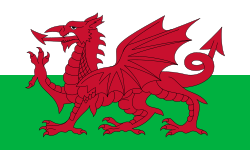| Wales at the 1930 British Empire Games | |
|---|---|
 | |
| CGF code | WAL |
| CGA | Wales at the Commonwealth Games |
| Website | teamwales |
| in Hamilton, Ontario, Canada | |
| Medals Ranked 7th |
|
| British Empire Games appearances | |

Wales at the 1930 British Empire Games (abbreviated WAL) was the first appearance of the country at the inaugural games. Wales has competed in every edition of the Commonwealth Games. In the first edition at Hamilton, Ontario, from 16 to 23 August 1930, just 11 teams took part and of them, 5 other countries have also competed in every edition since then. [1]
Contents
Wales came 7th overall in the games, with 2 silver medals and 1 bronze, [2] with all three medals were won by the female swimmer Valerie Davies.
Only the Welsh Amateur Swimming Association sent a team [3] and an athletics team was not sent to the games. This was probably due to the structure of Welsh athletics at the time. Various English regional associations governed the sport in Wales with no Welsh national association in existence. Reg Thomas, the 1930 Welsh 880 yards and 1 mile champion, competed as a member of the English team. He won the mile and placed second in the 880yds.